The SOL Continental Conference – with five women coaches – is an exception to the rule in District One where only 29 percent are female coaches. The article below is sponsored by Greystone Equipment Company.
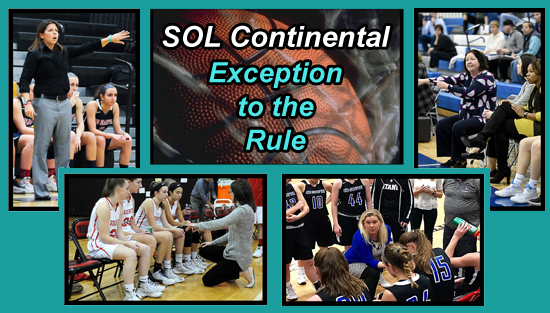
By Kate Harman
Liz Potash’s basketball binder is black with ‘The Rock’ brand logo on the bottom right corner. She got it as a giveaway, she remembers, and bought a matching messenger bag at a coaching clinic sometime later.
Inside it are practice plans, a flash drive, scouting notes and various other things the Central Bucks East coach needs. It’s always out on her desk in Room 112 of Council Rock South High School, where she is the Health and Physical Education District Curriculum Coordinator.
“It’s basketball season,” Potash said. “I’m always planning something.”
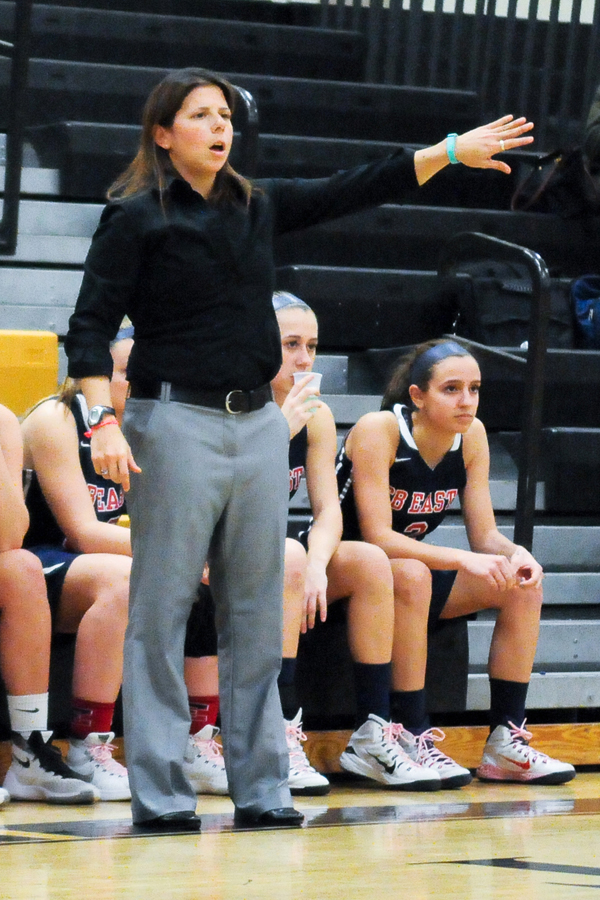 When you open the binder, and look right in the inside pocket you learn about some of what’s important to her. Potash is after all, a basketball nut, someone who says things like, “Can we agree that Pat Summitt’s last book was her best?” and gushes about Brenda Frese of Maryland and Gregg Popovich. Because of this, inside the binder is an article about the Spurs head coach and another a mentor sent her from her first game coaching at the varsity level.
When you open the binder, and look right in the inside pocket you learn about some of what’s important to her. Potash is after all, a basketball nut, someone who says things like, “Can we agree that Pat Summitt’s last book was her best?” and gushes about Brenda Frese of Maryland and Gregg Popovich. Because of this, inside the binder is an article about the Spurs head coach and another a mentor sent her from her first game coaching at the varsity level.
Her favorite quotes from these articles are highlighted. Potash likes highlighting. Towards the bottom is one from a Sports Illustrated article, something Becky Hammon, former WNBA star and current assistant under Popovich, said. Potash looks at it all the time.
"Character is genderless. Leadership is genderless. If you're a great leader, you're a great leader. Patience, service, the ability to listen—either you have it or you don't."
Hammon’s right. Those traits are not exclusive to one biological sex.
But what if only one constitutes the majority representation on the sideline? What message is being sent about those characteristics, then?
What message is being sent that Potash is one of only 52 female coaches of girls’ basketball teams in Southeastern Pa. - an area that features roughly 11 leagues and 175 teams– a region long considered a hotbed of talent and competition not just in the state, but nationally as well.
 Fifty-two women, coaching girls. And five compete in the seven-team Suburban One Continental. Seventy-one percent representation compared to the average, 29 percent.
Fifty-two women, coaching girls. And five compete in the seven-team Suburban One Continental. Seventy-one percent representation compared to the average, 29 percent.
Potash is joined by Souderton’s Lynn Carroll, North Penn’s Maggie deMarteleire, Beth Mattern of Central Bucks South and Laura Whitney at William Tennent. Like Potash they all live for it.
They all have different stories with varying backgrounds. They are five women with different strategies, styles, circumstances. Some of them came into coaching by traditional ways, others non-traditional. But there they are, shaking each other’s hands at midcourt, night after night.
“Personally, what I value, what I take pride in, is the opportunity that we all have,” Carroll said. “Maggie, Beth, Liz, Laura, we have this fortunate opportunity to be role models for young women and it’s important and it’s neat that we all are very different – in personality, coaching style. It’s an important, powerful thing for girls to have good positive female role models.”
******
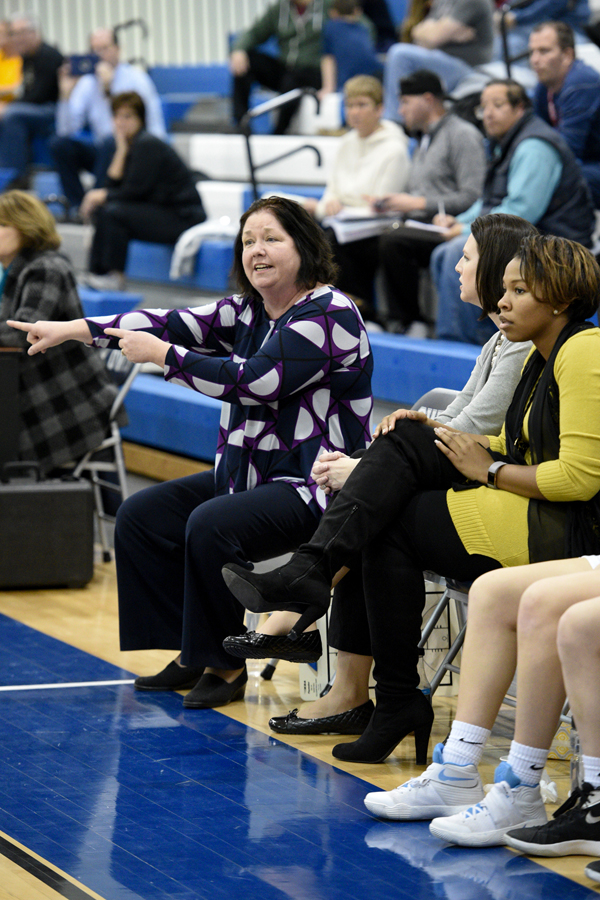 deMarteleire lived in Riverside, NJ when she worked for the Post Office, having already resigned herself to a life devoid of coaching before she took a junior varsity job at Lansdale Catholic. Her children, Michael and Jacqueline, were small then, but she applied for the position in 1988 anyway, after seeing a younger sister go through four coaches in four years at the school. Now she has won over 500 career games.
deMarteleire lived in Riverside, NJ when she worked for the Post Office, having already resigned herself to a life devoid of coaching before she took a junior varsity job at Lansdale Catholic. Her children, Michael and Jacqueline, were small then, but she applied for the position in 1988 anyway, after seeing a younger sister go through four coaches in four years at the school. Now she has won over 500 career games.
Mattern worked in pharmaceuticals full-time when a stint as an assistant made her realize she wasn’t destined for a professional, career setting, but was instead more of a “teaching, coaching person.” She changed jobs, and now she’s been a biology teacher for 13 years and is in her tenth season at the helm for the Titans.
Carroll was just 23 or 24 years old when she got the job at Souderton. Then, she was a few years removed from AmeriCorps, a gig as a ninth-grade coach at Abington and a junior varsity job at Norristown, but 13 years later she is the longest tenured coach in the conference
Whitney and her Panthers are both newcomers, as the former Archbishop Wood standout is in her first year coaching high school ball and Tennent is in its first season playing in the Continental.
And then there’s Potash, who after many years as an assistant saw an opening for the position with the Patriots and wondered with Mattern about who would fill the opening. Then it dawned on her, “Should I take the East job?” She did, four years ago.
So, different, yes. If you’ve met Carroll, deMarteleire, Mattern, Potash and
Whitney you’d know their differences. Who is more of a yeller versus who gesticulates more on the sideline? Who is more likely to have a calm demeanor on the bench? Who reaches first for the clipboard? Different backgrounds and experiences may make these women seem dissimilar, but on their road to the SOL Continental, common themes emerge.
 Not feeling ready. Having someone else push them to take a leap. Competition. Striving to be the best. Opportunities. Growth.
Not feeling ready. Having someone else push them to take a leap. Competition. Striving to be the best. Opportunities. Growth.
Their stories aren’t unique to athletics. No, the stories could apply to a variety of professions - but the realm of sports does seem to exacerbate the issues at hand.
“I feel like women aren’t respected as coaches,” former C.B. South star and current freshman for the University of the Sciences, Jordan Vitelli, said. “A lot of people are overlooked or are considered not as hard because they are women. For guys, the stereotype is that people would assume they aren’t compassionate.
“For example, if we were running sprints and struggling, the stereotype is that a female coach would say, ‘Okay, you can stop now’ where a male is expected to push you. It’s stereotypes. Stereotypes are throughout our entire world.”
That’s coming from Vitelli, who currently has a female coach in Jackie Hartzell, played for Mattern, and described herself as having a very close relationship with Danielle Turner, the Titans’ athletic director.
Jen Carangi knows a little something about being typecast. Currently, she’s an assistant at North Penn, where her daughter, Sam, has been the starting point guard for four years, is a 1000-point scorer and will play for Harry Perretta at Villanova next season.
But before she had kids, Carangi coached at Wissahickon, where she noticed that she was often the only woman in the room. She’s also coached her son’s all-boys travel team up until sixth grade.
Once, before Rob’s game, she was at the scorer’s table when the opposing coach came over to tell her what end of the court her team was supposed to warm up on.
Carangi knew where her team was supposed to warm up. After all, she wasn’t just a parent filling in last minute like he assumed. She replied, “I got it, thanks.”
That’s when her assistant came up to the table and said to the other coach - much to his extreme embarrassment, “Yeah, well she played at Villanova.”
*****
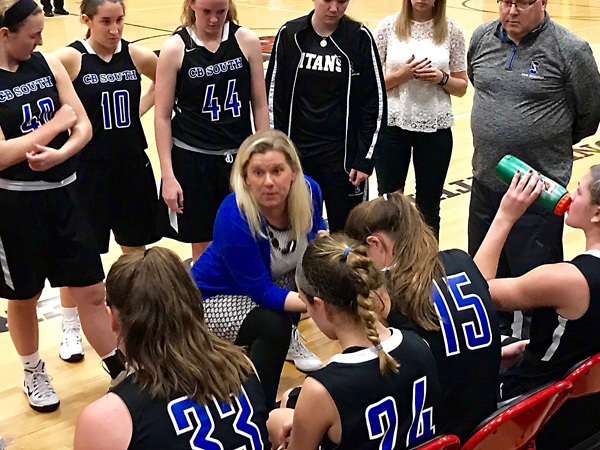 Why aren’t there more women coaching? In large part, because they aren’t applying.
Why aren’t there more women coaching? In large part, because they aren’t applying.
“Everybody is given equal opportunity to apply and be reviewed,” Turner, who is one of only three female athletic directors in the entire SOL and also serves as the female athletics representative for District 1, said. "Generally speaking, we get significantly more male applicants for our jobs than female. I wish there were more female applicants for our job opportunities. In my experience, female coaches can provide a positive role model for our female student athletes.”
So, the numbers aren’t there, which begs the questions, why aren’t they applying?
The obvious answer is family obligations. In fact, all five women know former coaches who stopped doing so to start families. Of course, men across all sports get married and have kids, too, but aren’t expected to quit their jobs or made to feel guilty for wanting to continue coaching. And while men make up the majority of the coaching jobs in high school girls’ basketball, no woman coaches a boys’ team.
“[Fifty female coaches] doesn’t really surprise me. It comes down to the expectations of women,” deMarteleire, who cited the immense support of her husband, Mike, and children as being extremely vital to her success, said. “The roles within the family have changed over time but not that much. The laundry, groceries, cooking, all that kind of stuff. I know not every family is like that but a lot of that falls on the woman. I feel like in that aspect, if you are married and have children it is just more difficult to coach.”
Family is the easy answer to the question, the one that makes the most sense and is hard to argue with. The other reasons why there aren’t more women in coaching are harder to discuss and come with more strings attached. In fact, those reasons deal with a lot of what Vitelli discussed.
“Misconceptions and stereotypes force me to think differently,” Bianca Picard, who played for Carroll at Souderton and continued at the New Jersey Institute of Technology before an injury ended her career, said. “I look at that as a strength of mine. As a woman, I feel like I need to be even more creative with my ideas just to get my foot in the door.”
 Picard, now a senior at New York University, is a video production intern with the Brooklyn Nets, where she is the only female on a small staff.
Picard, now a senior at New York University, is a video production intern with the Brooklyn Nets, where she is the only female on a small staff.
“I always have to be on top of my game,” Picard said, adding she often thinks about what it would be like having a woman as a supervisor or more women to interact with.
“Look at relationship I had with coach Carroll - that was one in a million,” Picard said. “I told myself that if I ever got hurt – and I said this to coach Carroll – that if I got hurt and could never play the game again I would hope to be a coach one day. I remember when I scored my 1000thpoint, she said that basketball is in our blood, that it is something we were meant to do. Thinking about it, I’m not in a position to coach, but I’m with the Nets. Just to still be around the game is enough for me right now.”
*****
Stereotypes. Perceived notions of jobs and who should be doing them. Preconceived ideas of who can handle what or how. Hegemonic norms.
Why else would there be roughly the same number of women coaching today, as there were when deMarteleire started in 1988?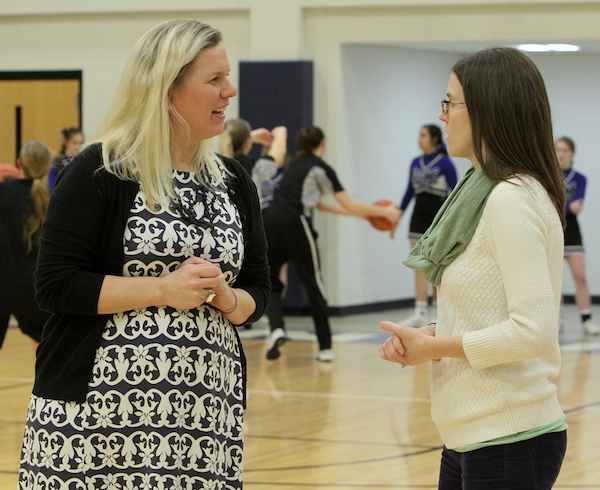
It’s not that cut and dry, of course, and almost all of the women pointed to the growth of the college game and the number of women coaching in those ranks as positive signs, steps in the right direction. But still, recent studies done by the National Collegiate Athletic Association found that fewer women coach the college game than ten years ago.
As deMarteleire noted, however, different barriers often plague those coaching at the high school level as opposed to women at universities, including full-time vs part-time and monetary factors, which can make it easier to pay for child care, among other things.
“It’s not a job you do just to do it,” Mattern said. “If you do it just to do it and get by, you aren’t going to be successful. It will show that you aren’t putting the time in, aren’t doing the scouting, aren’t doing everything you need in order to be successful. I see the coaches in our league everywhere, scouting, talking basketball, living it – really trying to go get it.
“What I do, and from what I know about what the coaches in our league do, that is just what you do to be a good coach,” Mattern continued. “I don’t think it has anything to do with your gender but just the expectations of being a good coach and doing this job.”
Potash thinks that being a woman was helpful to her during the hiring process and stated that she thinks the current coaching environment is one conducive to athletic departments hiring women, while deMarteleire believes that eventually a woman will coach a men’s or boys’ squad.
Optimism, and yet, there still are other forces at play.
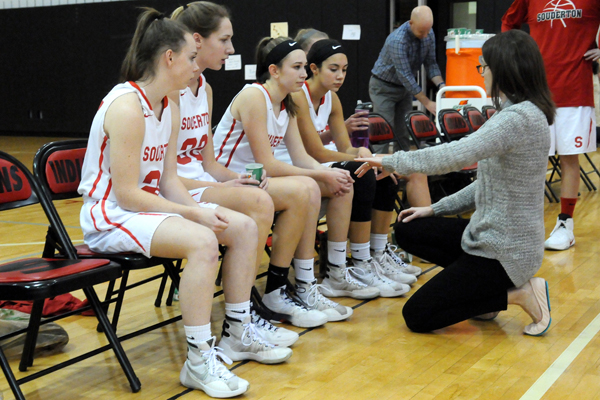 “I don’t know if I have to work harder because I’m a woman,” Carroll said. “But I do think I need to have thick skin. When those situations come up, I have to remind myself, that I am whatever adjective is appropriate at the time, that I’m good at what I do and that I’m not going to let this person be the one that doubts myself, makes me want to get out of coaching.
“I don’t know if I have to work harder because I’m a woman,” Carroll said. “But I do think I need to have thick skin. When those situations come up, I have to remind myself, that I am whatever adjective is appropriate at the time, that I’m good at what I do and that I’m not going to let this person be the one that doubts myself, makes me want to get out of coaching.
“I have definitely dealt with other adults where I’ve gotten the sense that they have a difficult time accepting my role as the leader who doesn’t need input from them,” she continued. “Is that the reality? Is it just my perception? I do feel like things I’ve said or done, my personality in general, would be more acceptable if I were a man.”
What may be deemed more acceptable regardless of gender? All of the winning these women do.
Combined the coaches total well over 900 career wins, a district title, and dozens of postseason victories – including at the state level. Four of the programs - C.B. East, C.B. South, North Penn, and Souderton – advanced to this year’s PIAA Class 6A state tournament, comprising over a third of District 1 representation in the playoffs.
And on Thursday, the Titans face off against Big Red, while the Knights match up against the Patriots in the second round, meaning all four teams advanced to the final 16 in the entire state, with two guaranteed to be in the last 8 standing.
“I guess I would be lying if I said it wasn’t difficult,” Whitney said of the competition. “Every single night it seems like you are going up against one of the top-ranked teams in the state. The league is definitely one of the best in the area, so it is especially challenging when you are trying to rebuild a program and trying to instill confidence in these girls to get them to believe we are doing the right thing – heading in the right direction. When you aren’t getting the results you want in terms of wins and losses it can be tough for them to continue to trust the process and continue to stay with what we are building.
“But I’m glad we are in the tougher division because my ultimate goal is to be one of those top teams,” Whitney continued. “I think it is only helping our girls make them better. When we play those tougher teams it gives them the sense that they can believe in themselves and can be as good as everyone else.”
*****
When Bridget Birkhead, a senior on the Patriots, was younger – 4 or 5 – her dad, Bo, started helping coach her basketball team. He did it until she was about 13 years old, the Mount St. Mary’s recruit said. She liked that he was the assistant, that he wasn’t “the guy in charge.” For her, that meant he wasn’t the screamer, instead he got to focus on helping and teaching.
“I want to always be around basketball,” Birkhead said. “It’s been with me my whole life. I just want to help and teach and have fun. Have kids love the game the way I fell in love with the game.”
It was a recent decision, Birkhead said, one brought on by meeting and watching college coaches during the recruiting process. One made after watching those characteristics Hammon talked about in action, the ones Birkhead’s coach carries around with her.
But if those traits: character, leadership, patience, service, and listening are genderless, if a man or a woman can have them, then shouldn’t there be just as many women as men on the sidelines? And shouldn’t women be coaching the more physical, athletic style of boys’ basketball, just like men coach the strategy-focused, team-oriented design of the girls’ game?
Maybe it’s time to give them a chance.
If you’re not sold on that prospect; if it seems too radical or unrealistic, then take some time and look no further than the women of the Continental.
- Log in to post comments

